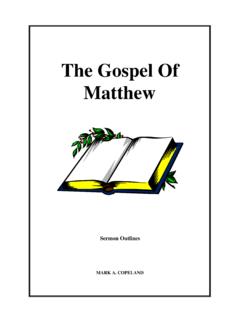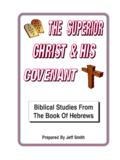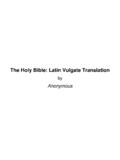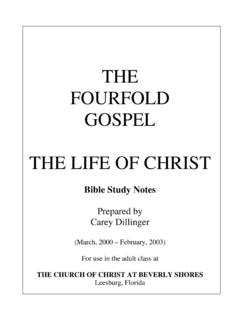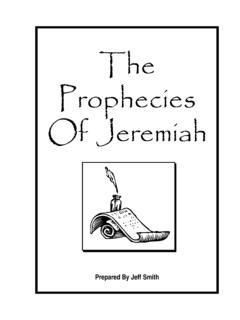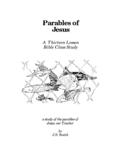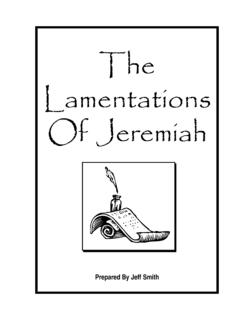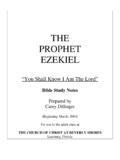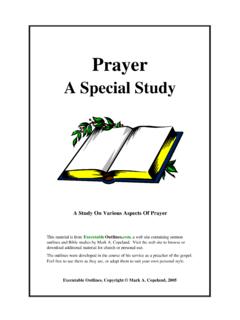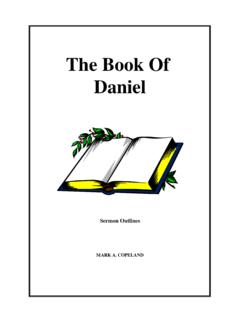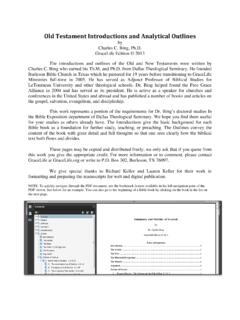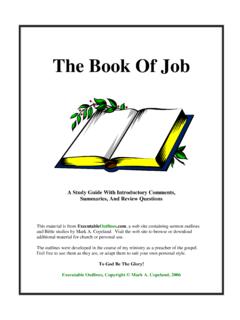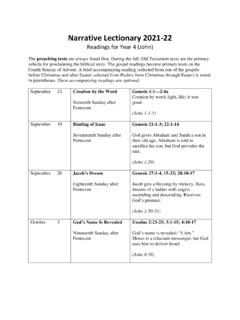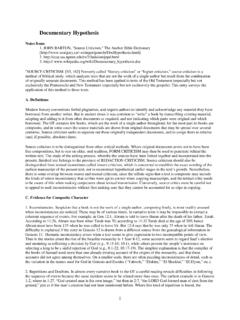Transcription of The Book Of Job - Bible Study Guide
1 The book Of JobA Study Guide With Introductory Comments,Summaries, Outlines, And Review QuestionsMARK A. COPELANDThis Study Guide is from The Executable Outlines Series, a collection of sermonoutlines and Bible Study lessons by Mark A. Copeland . Visit the EO web site( ) to browse and download the material for church or personal book OF JOBT able Of ContentsIntroduction To The Book3 Prologue - Job Is Tested (1-2)8 Job's Soliloquy (3)14 The Great Debate: 1st Cycle Of Speeches (4-14)16 The Great Debate: 2nd Cycle Of Speeches (15-21)23 The Great Debate: 3rd Cycle Of Speeches (22-31)28 Young Elihu Speaks (32-37)34 God Speaks To Job (38:1-42:6)39 Epilogue - Job Is Blessed (42.)
2 7-17)43 Concluding Thoughts On The Book46 This Study Guide was developed in preparation for teaching adult Bible objectives for each section are usually things I plan to emphasize during have found that summarizing and outlining helps me to better understand the Wordof God. It is a practice I highly recommend to generally delete the answers to the review questions before printing the materialand giving it to the students. But that you might know what answers were intendedby the questions, I have included them in these hope that you find the material beneficial. Some have used it for personal devotions, and others in theirchurch or home Study groups.
3 In whatever way it can be used to the glory of God, I am Executable Outlines Series, Copyright Mark A. Copeland, book Of JobMark A. Copeland 2 THE book OF JOBI ntroduction To The BookThe book of Job has long been praised as a masterpiece of literature. Consider these quotes: Tomorrow, if all literature was to be destroyed and it was left to me to retainone work only, I should save Job. (Victor Hugo) ..the greatest poem, whether of ancient or modern literature. (Tennyson) The book of Job taken as a mere work of literary genius, is one of the mostwonderful productions of any age or of any language.
4 (Daniel Webster)What is it about the book that prompts such praise? Most Christians I know don t feel that way aboutthe book of Job. Perhaps it is because many tend to neglect the old testament altogether. Yet Paulwrote of the value of the old testament scriptures:For whatever things were written before were written for our learning, that wethrough the patience and comfort of the Scriptures might have hope. (Ro 15:4)Note that the old testament was written for our learning, that it provides patience and comfort, and assuch can be a source of hope. This is especially true with the story of Job, to whom James referred when seeking to instill patience (cf.)
5 Ja 5:10-11). Because the book of Job is so often neglected, yetpresents a valuable lesson and is so highly praised by even people of the world, Christians shouldcertainly take the time to Study this portion of God s Word!THE PLACE OF JOB IN THE OLD TESTAMENTJob is the first of five books commonly referred to as The Books Of Poetry . These include Job,Psalms, Proverbs, Ecclesiastes, and the Song of Solomon. Called such because they are written inpoetic style in contrast to the narrative style of most other books, they are also often referred to as Wisdom Literature (especially Job, Proverbs, and Ecclesiastes).
6 Oswald Chambers (1874-1917)offered this concise summary of the five books:wJob - How to sufferwPsalms - How to praywProverbs - How to actwEcclesiastes - How to enjoywSong of Solomon - How to loveThe book Of JobMark A. Copeland 3 Now let s take a look at the book of Job in AND DATE OF WRITINGWho wrote the book , and when? No one really knows. Jewish tradition attributes the book to Moses,and other authors have been suggested (Job, Elihu, Solomon, Isaiah, Hezekiah, and Baruch, Jeremiah sscribe). All that can be said with certainty isthat the author was a loyal Hebrew who was not strictly bound by the popular creed thatassumed suffering was always the direct result of sin.
7 (Jamieson, Fausset, and Brown) Becausethe author is unknown, it s date has been hotly debated among scholars. Some think it was writtenbefore Moses (pre 1500 ). Others put it at the time of Solomon (ca. 900 ), and some even aslate as the Babylonian Exile or later (post 600 ).The uncertainty of author and date does not nullify the book s inspiration, for it is affirmed in the NewTestament. Paul quotes from it on several occasions in his writings (cf. 1 Co 3:19 with Job 5:13; andRo 11:35 with Job 4:11). For the Christian who accepts the inspiration of the New testament , suchevidence is HISTORICITY OF THE BOOKEven though inspired, are we to take the events described in it as historically true?
8 There are severalreasons for believing that they are:wThe style of the opening and close of the book certainly conform to other Biblicalnarratives that are historical (cf. 1:1 with 1 Sam 1:1 and Lk 1:5).wIn the book of Ezekiel, Job is mentioned along with Noah and Daniel, two otherfigures of history (Eze 14:14).wJames, the Lord s brother, refers to Job as an example of perseverance (Ja 5:11).THE SETTING OF THE BOOKThe historical events appear to be set in the Patriarchal period ( , sometime between Noah andMoses). There are no allusions to the Law of Moses in the book , but there is a mention of a flood(22:16).
9 Job functions as a priest in offering sacrifices for his family (1:5), similar to what we find withAbraham (cf. Gen 12:7). His longevity is typical of the patriarchs (42:16; cf. Gen 11:22-26,32). Forsuch reasons I would place him somewhat contemporary with Abraham ( , ca 2000 ).THE PURPOSE OF THE BOOKIt is common to suggest that the purpose of the book is to answer the age-old question, Why doesGod allow the righteous to suffer? That is certainly the question Job raises, but it is worthy to note thathe himself never receives a direct answer. Nor is one given by the author, other than to answer Satan schallenge, Does Job fear God for nothing?
10 We are privileged to know of the challenge of Satan, andThe book Of JobMark A. Copeland 4that God allows Job to suffer in answer to that challenge, but Job is never told of this. Therefore, Isuggest that the purpose of the book is:To answer the question, How should the righteous suffer? While Job s questions and complaints often come close to charging God with wrong, he never crossesthe line and humbly submits to God when told that the answers to his questions are beyond his ability to understand. Thus the book shows us how the righteous should bear up under suffering ( You haveheard of the perseverance of Job - Ja 5:11).
